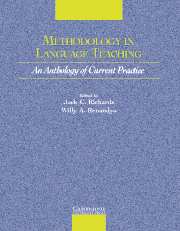Book contents
- Frontmatter
- Contents
- Acknowledgments
- Introduction
- Section I Approaches to Teaching
- Section 2 Lesson Planning and Classroom Management
- Section 3 Classroom Dynamics
- Section 4 Syllabus Design and Instructional Materials
- Section 5 Task and Project Work
- Section 6 Learning Strategies
- Section 7 Teaching Grammar
- Section 8 Teaching Pronunciation
- Section 9 Teaching Speaking
- Section 10 Teaching Listening
- Section 11 Teaching Vocabulary
- Section 12 Teaching Reading
- Chapter 26 Dilemmas for the Development of Second Language Reading Abilities
- Chapter 27 Teaching Strategic Reading
- Chapter 28 Extensive Reading: Why Aren't We All Doing It?
- Section 13 Teaching Writing
- Section 14 Assessment
- Section 15 Technologies in the Classroom
- Section 16 Professional Development
- Credits
- Author Index
- Subject Index
- References
Chapter 28 - Extensive Reading: Why Aren't We All Doing It?
Published online by Cambridge University Press: 10 November 2010
- Frontmatter
- Contents
- Acknowledgments
- Introduction
- Section I Approaches to Teaching
- Section 2 Lesson Planning and Classroom Management
- Section 3 Classroom Dynamics
- Section 4 Syllabus Design and Instructional Materials
- Section 5 Task and Project Work
- Section 6 Learning Strategies
- Section 7 Teaching Grammar
- Section 8 Teaching Pronunciation
- Section 9 Teaching Speaking
- Section 10 Teaching Listening
- Section 11 Teaching Vocabulary
- Section 12 Teaching Reading
- Chapter 26 Dilemmas for the Development of Second Language Reading Abilities
- Chapter 27 Teaching Strategic Reading
- Chapter 28 Extensive Reading: Why Aren't We All Doing It?
- Section 13 Teaching Writing
- Section 14 Assessment
- Section 15 Technologies in the Classroom
- Section 16 Professional Development
- Credits
- Author Index
- Subject Index
- References
Summary
INTRODUCTION
Applied linguists have in recent years begun to move away from a preoccupation with the best methods of language teaching to a view that seeks to better understand the nature of language learning and teaching. Rather than introducing new methods of teaching, they are now more concerned with describing language pedagogy that is based on a principled understanding of second language learning. Brown (Chapter 1 of this volume) and Kumaravadivelu (1994), for example, have proposed a set of teaching/learning principles to which any good language pedagogy should conform. Examples of these principles include providing a rich linguistic environment, respecting and capitalizing on learners' contribution to the learning process, and emphasizing fluency over, but not at the expense of, accuracy (see Richards, Chapter 14 of this volume).
Extensive reading (ER), with its emphasis on encouraging learners to read self-selected, large amounts of meaningful language, fits well with current principles for good second and foreign language pedagogy (Grabe, Chapter 26 of this volume; Day & Bamford, 1998). In this paper, we briefly describe what ER is, how it is different from intensive reading, what its learning benefits can be for students, and what theories underpin ER. The paper also discusses some of the reasons why many teachers are still not implementing ER.
Information
- Type
- Chapter
- Information
- Methodology in Language TeachingAn Anthology of Current Practice, pp. 295 - 302Publisher: Cambridge University PressPrint publication year: 2002
References
Accessibility standard: Unknown
Why this information is here
This section outlines the accessibility features of this content - including support for screen readers, full keyboard navigation and high-contrast display options. This may not be relevant for you.Accessibility Information
- 16
- Cited by
